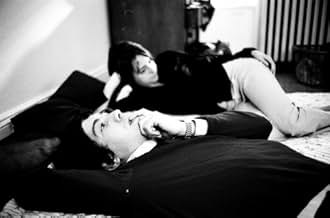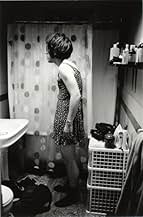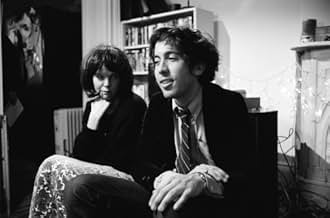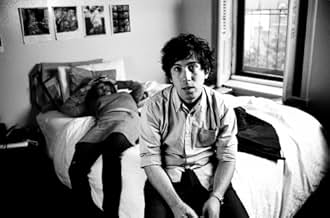Alan is a musician who leaves a busted-up band for New York, and a new musical voyage. He tries to stay focused and fends off all manner of distractions, including the attraction to his good... Read allAlan is a musician who leaves a busted-up band for New York, and a new musical voyage. He tries to stay focused and fends off all manner of distractions, including the attraction to his good friend's girlfriend.Alan is a musician who leaves a busted-up band for New York, and a new musical voyage. He tries to stay focused and fends off all manner of distractions, including the attraction to his good friend's girlfriend.
- Awards
- 2 wins & 3 nominations
- Director
- Writer
- All cast & crew
- Production, box office & more at IMDbPro
Storyline
Did you know
- ConnectionsSpin-off Peoples House (2007)
Featured review
Here's a drama of sorts, done up in grainy, black & white, faux verité style to simulate a documentary of a moveable feast of trust children and other well heeled, well educated slackers, all Brooklyn apartment denizens, whom we follow around during their standard issue daily lives. I suspect - though I don't know and haven't read - that the actors were told the general arc of the film and assigned broad outlines of their characters (maybe they even helped to develop them: the method of the English director, Mike Leigh), then allowed to ad lib within those limits. The dialogue surely has that feel.
The major subtext here is friendship. The action, if you can call a long series of sedentary conversations that, centers around a trio of characters: Lawrence (Andrew Bujalski, also the writer-director), his girlfriend Ellie (Rachel Clift), and Lawrence's long time best friend Alan (Justin Rice), who has just come to town after his rock band, "The Bumblebees," had broken up in Boston. A crackle of attraction fills the air between Ellie and Alan, and a lingering issue throughout the film is what will develop between them, and what will become of Lawrence's ties to both.
The principals and their friends prattle on about such crucial matters as the iron deficiency that can develop from vegan diets (Alan's friend's solution to this was: eat meat); honesty; what to do after someone kisses you; making pop music and performance art; taking "proactive control of one's destiny," as Ellie puts it to Lawrence at one point; obtaining and smoking good weed and occasionally maybe scoring some cocaine, though it's not a big deal; hitting Dad up for dollars; Buddhism; elliptical references to some other people - erstwhile close chums - getting married. .
Those are the searingly important issues of the day for these young adults. Nothing about politics, social or global issues. Not a word about career, except for Alan's aspirations to make it as a rocker (Mr. Rice has an arresting singing voice with a faintly Irish lilt to it). The talk goes on and on for 110 minutes. It's "My Dinner with Andre," without Andre. And without dinner. No arc. No resolution. No character changes. Not even an interesting idea or two. Just slices of daily life, like I said. The whole enterprise feels (a) realistic and (b) boring, agonizingly boring.
One saving grace is Mr. Rice, whose Alan is a shy, beguiling, endearing rogue of a fellow for sure. The other thing is absence of cigarettes. For the longest time I thought this would be a fag-free movie, and it almost is. Only in the 85th minute was one cigarette smoked, shared between Ellie and Alan as a sort of 40s style sexual signal. And not again. This film is marginally better than Lila Yomtoob's recent movie "High Life," about the same Brooklyn-dwelling, beer drinking young slacker social set.
My partner and I have ties to a group of "younger" adults, now approaching 40, who attended college together and then migrated more-or-less as a group to San Francisco, where most of them continue to live. Their bonds remain palpable and enduring. A dozen years ago their daily lives might have looked, to an outside viewer, a lot like the people in this film. Today it's different, but only in some respects. Most have solved the problem of vocation, one way or another, and they are more interesting than the 20-somethings because of it.
One has followed a traveling circus, becoming proficient as a sword swallower. When not on the road he lives in a warehouse by the Bay with his partner, a woman who arranges sets for the opera. Another flies in for parties from D.C., where he now works for the IMF. Yet another is an agronomist who is about to finish law school, and one sells art at an upmarket gallery near Union Square. Our friend, who has lived in Japan and studied Butoh dancing, is now a freelance, self-taught finish carpenter and fine cabinet maker.
Our friend only became political in his early 30s, shifting dramatically from indifference to activism. In terms of their intimate lives - their capacities to establish and sustain romantic or conjugal relationships - it's still a much more mixed picture for our friend's group. Some have married, others not. For several, although they are highly personable individuals, "permanent" love relationships still remain just beyond their reach.
I bring up this group not so much to suggest those things that may and may not change as singles move from their 20s into their 30s, but primarily to make a very different point. Our friend's friends would have no interest in or even knowledge of us, nor is it likely that we would know or care about them, fascinating people though they are, were it not for the connections the social network that exists through our friend. He was my stepson's dearest chum in childhood; my partner has known him since he was 5, and I have enjoyed his company for over 10 years. It is because of our friend that his circle interests us so.
To sharpen the point, there are only two reasons for anybody to care about the group of kids in this movie: (a) you identify with them: you're a kid yourself, in fact or in terms of your own psychological makeup; or (b) one of them IS your daughter, son, or a longstanding friend of theirs. For everybody else, and that's most of us, this film basically sucks. My grades: 5/10, C. (Seen on 02/09/06).
The major subtext here is friendship. The action, if you can call a long series of sedentary conversations that, centers around a trio of characters: Lawrence (Andrew Bujalski, also the writer-director), his girlfriend Ellie (Rachel Clift), and Lawrence's long time best friend Alan (Justin Rice), who has just come to town after his rock band, "The Bumblebees," had broken up in Boston. A crackle of attraction fills the air between Ellie and Alan, and a lingering issue throughout the film is what will develop between them, and what will become of Lawrence's ties to both.
The principals and their friends prattle on about such crucial matters as the iron deficiency that can develop from vegan diets (Alan's friend's solution to this was: eat meat); honesty; what to do after someone kisses you; making pop music and performance art; taking "proactive control of one's destiny," as Ellie puts it to Lawrence at one point; obtaining and smoking good weed and occasionally maybe scoring some cocaine, though it's not a big deal; hitting Dad up for dollars; Buddhism; elliptical references to some other people - erstwhile close chums - getting married. .
Those are the searingly important issues of the day for these young adults. Nothing about politics, social or global issues. Not a word about career, except for Alan's aspirations to make it as a rocker (Mr. Rice has an arresting singing voice with a faintly Irish lilt to it). The talk goes on and on for 110 minutes. It's "My Dinner with Andre," without Andre. And without dinner. No arc. No resolution. No character changes. Not even an interesting idea or two. Just slices of daily life, like I said. The whole enterprise feels (a) realistic and (b) boring, agonizingly boring.
One saving grace is Mr. Rice, whose Alan is a shy, beguiling, endearing rogue of a fellow for sure. The other thing is absence of cigarettes. For the longest time I thought this would be a fag-free movie, and it almost is. Only in the 85th minute was one cigarette smoked, shared between Ellie and Alan as a sort of 40s style sexual signal. And not again. This film is marginally better than Lila Yomtoob's recent movie "High Life," about the same Brooklyn-dwelling, beer drinking young slacker social set.
My partner and I have ties to a group of "younger" adults, now approaching 40, who attended college together and then migrated more-or-less as a group to San Francisco, where most of them continue to live. Their bonds remain palpable and enduring. A dozen years ago their daily lives might have looked, to an outside viewer, a lot like the people in this film. Today it's different, but only in some respects. Most have solved the problem of vocation, one way or another, and they are more interesting than the 20-somethings because of it.
One has followed a traveling circus, becoming proficient as a sword swallower. When not on the road he lives in a warehouse by the Bay with his partner, a woman who arranges sets for the opera. Another flies in for parties from D.C., where he now works for the IMF. Yet another is an agronomist who is about to finish law school, and one sells art at an upmarket gallery near Union Square. Our friend, who has lived in Japan and studied Butoh dancing, is now a freelance, self-taught finish carpenter and fine cabinet maker.
Our friend only became political in his early 30s, shifting dramatically from indifference to activism. In terms of their intimate lives - their capacities to establish and sustain romantic or conjugal relationships - it's still a much more mixed picture for our friend's group. Some have married, others not. For several, although they are highly personable individuals, "permanent" love relationships still remain just beyond their reach.
I bring up this group not so much to suggest those things that may and may not change as singles move from their 20s into their 30s, but primarily to make a very different point. Our friend's friends would have no interest in or even knowledge of us, nor is it likely that we would know or care about them, fascinating people though they are, were it not for the connections the social network that exists through our friend. He was my stepson's dearest chum in childhood; my partner has known him since he was 5, and I have enjoyed his company for over 10 years. It is because of our friend that his circle interests us so.
To sharpen the point, there are only two reasons for anybody to care about the group of kids in this movie: (a) you identify with them: you're a kid yourself, in fact or in terms of your own psychological makeup; or (b) one of them IS your daughter, son, or a longstanding friend of theirs. For everybody else, and that's most of us, this film basically sucks. My grades: 5/10, C. (Seen on 02/09/06).
- roland-104
- Nov 25, 2006
- Permalink
Details
Box office
- Gross US & Canada
- $103,509
- Opening weekend US & Canada
- $13,141
- Sep 3, 2006
- Gross worldwide
- $121,292
- Runtime1 hour 49 minutes
- Color
- Aspect ratio
- 1.66 : 1
Contribute to this page
Suggest an edit or add missing content
























